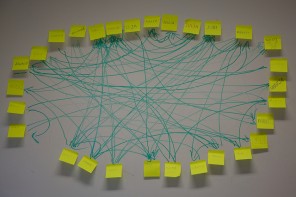At the 2018 MLA Annual Convention in New York, the MLA held its first Possible Futures Career Fair. The fair was something of an experiment. For three years now we’ve been running “A Showcase of Career Diversity,” a convention session in which language and literature PhDs employed outside the academy talk about their careers. But the organizations where the participants are employed rarely have job openings, so we wanted to bring MLA job seekers together with recruiters.
Experiments rarely work perfectly the first time you run them. Although there was a lot of excitement and buzz at the career fair, it was also clear to me that the recruiters and the job seekers weren’t all speaking the same language. One question that job seekers commonly asked struck me as emblematic of the problem:
“How would a PhD fit in at your organization?”
When recruiters didn’t know how to answer this question, some job seekers were left feeling as though there was no place for them in the recruiters’ organizations. Meanwhile, the recruiters were confused about what the question really meant. To them, a PhD was simply an advanced degree. Asking how a PhD would fit in at their organization didn’t make any more sense than asking, “How would an MA fit in at your organization?”
Of course, to an MLA job seeker, “PhD” means so much more. MLA job seekers interpret “PhD” as a shorthand for a commonly understood set of experiences, skills, and values. For them, “PhD” means that they have spent years developing expertise that is both broad and deep. It means that they have significant teaching and research chops, as well as unusual intellectual stamina and self-discipline. It also suggests a set of values related to education, inquiry, and the production of knowledge.
Do recruiters unfamiliar with academic culture understand that a mere three letters imply all this? Probably not. Should we assume that they do? Definitely not.
In fact, while “PhD” does serve as a shorthand within academia, it encompasses many possible experiences and skill sets. Some of these experiences and skill sets might be better described through labels such as teacher, researcher, linguist, administrator, adviser, writer, archivist, historian, and editor. I think it’s helpful to parse out what we really mean when we ask, “How would someone with a PhD fit in at your organization?” and acknowledge that, in fact, “PhD” does not mean the same thing for everyone.
Therefore, a question you should be asking yourself is this: “What does ‘PhD’ mean for me?”
Answering this question requires serious thought and self-reflection, and packaging the answer in terms that a recruiter will understand requires even more. I recommend getting the answer down to an introduction or pitch of thirty seconds (or less!). Yes, this exercise is likely to feel reductionist, but bear in mind that you are preparing for a career fair, where you’ll have a limited amount of time to catch and hold the attention of a recruiter. Consider the following examples:
“As a PhD student, I’ve really loved teaching. I’ve been teaching college students for the past five years, and I’ve also been working with grad students coming in to help prepare them to teach. What kinds of opportunities does your organization have for someone who loves to teach and wants to help others learn to teach?”
“I speak Spanish, French, and Catalan. I’m interested in putting my language skills to work for an international organization. What roles do you have for polyglots?”
“I’m very invested in higher education and making it accessible for as many students as possible. I’m a first-generation student myself, and I kind of just made it all up as I went along. I’d really like to help first-gen students coming into college now make better choices and feel less alone. What kinds of opportunities do you have in that area?”
You’ll notice that each of these introductions ends with a question that asks about specific types of opportunities. This kind of introduction does require that you know something about the organization (even just from a quick Google search). But the extra effort is worth it to ensure that you and the recruiter have a productive––and hopefully memorable––conversation.
A slightly different approach centers the conversation on the immediate needs of the organization. A job opening is really an expression of organizational needs, and a great way to find out where you might fit in is by asking the recruiter, “What challenges are facing your organization right now? What problems do you need to solve?” From there, you can discuss how you might help the organization meet those challenges and solve those problems (because of course, as a PhD, you are a quick learner, a nimble thinker, and an experienced problem solver).
Neither of these approaches assumes that you and the recruiter are starting with a shared set of assumptions about what a PhD is. Both of them give you and the recruiter a much richer starting point for a conversation about your experiences, skills, and knowledge and how they might benefit the organization.
Of course, it would be great if more recruiters did understand what we mean when we say “PhD.” But educating them takes time. While we work toward a greater awareness of the value that humanities PhDs can bring to an organization, I recommend giving thought to your own identity and parsing for yourself what you mean when you say “PhD.” Not only will you make a more lasting impression on recruiters, you may also gain greater awareness of yourself as a professional and a clearer understanding of your own skills, values, and goals.







